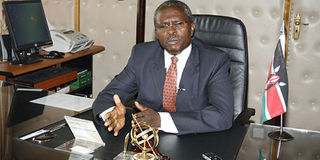PS disowns directive on Kiswahili

Education PS Karega Mutahi (above) disowned a Kenya National Examinations Council circular allowing Standard Eight pupils to make a choice between Kiswahili and the Kenyan Sign Language. He instead said only candidates with hearing difficulties would be allowed to choose between the two. Photo/FILE
A hasty retreat by the Kenyan Government on a new directive that seeks to make Kiswahili an optional subject in Standard Eight exam on Wednesday threw the education sector into confusion.
As scholars protested at the radical move, Education permanent secretary Karega Mutahi disowned a Kenya National Examinations Council (Knec) circular allowing Standard Eight pupils to make a choice between Kiswahili and the Kenyan Sign Language. He instead said only candidates with hearing difficulties would be allowed to choose between the two.
That was contrary to the Knec circular, sent to all schools, which read in part: “Candidates will be expected to take either Kiswahili or Kenyan Sign Language but not both.” Later, Knec boss Paul Wasanga also supported Prof Mutahi.
They spoke as scholars opposed the new move that sought to make Kiswahili an optional subject in the Kenya Certificate of Primary Education (KCPE) examination. Chama cha Kiswahili cha Taifa termed the move “unacceptable”. “We are extremely disturbed by the decision to make Kiswahili an optional subject at the KCPE level,” Prof Kimani Njogu, chairman of the organisation said.
It is wrong for the government to downgrade the country’s national language at a time efforts were being made to promote it across the region, he added. University of Nairobi Kiswahili lecturer Hezron Mogambi said the government should not even try to make the language optional for pupils who have difficulties in hearing. “All children in Kenya need to learn Kiswahili at the basic level,” he said.
According to the scholars, proficiency in the language has improved over the years as it was offered as a compulsory subject at KCPE level. Kenyans who don’t speak French, the association said, were now able to work using Kiswahili in Rwanda, Burundi and the Democratic Republic of Congo.
“The Ministry of Education should not be seen to be undermining employment opportunities for Kenyans through an erasure of Kiswahili in primary schools,” said the scholars. Kiswahili is set to become an official language if the proposed new constitution is adopted this year.
Kiswahili researcher Ahmed Sheikh Nabhany criticised Knec for making the proposal at a time the language was growing globally. “We will not allow this language to be an option in schools,” said the head of the Research Institute of Swahili Studies of East Africa.
Prof Nabhany appealed to fellow Kiswahili experts to reject the plan. “Kiswahili is a language of the East African community,” he said. According to a senior curriculum developer at the Kenya Institute of Education, Mr Francis Waititu, for a long time there has been a cry by disadvantaged students that they were being overburdened by studying three languages — Kiswahili, English and Kenya Sign Language.
Reported by Benjamin Muindi, Samuel Siringi, Hugholin Kimaro and Galgalo Bocha




